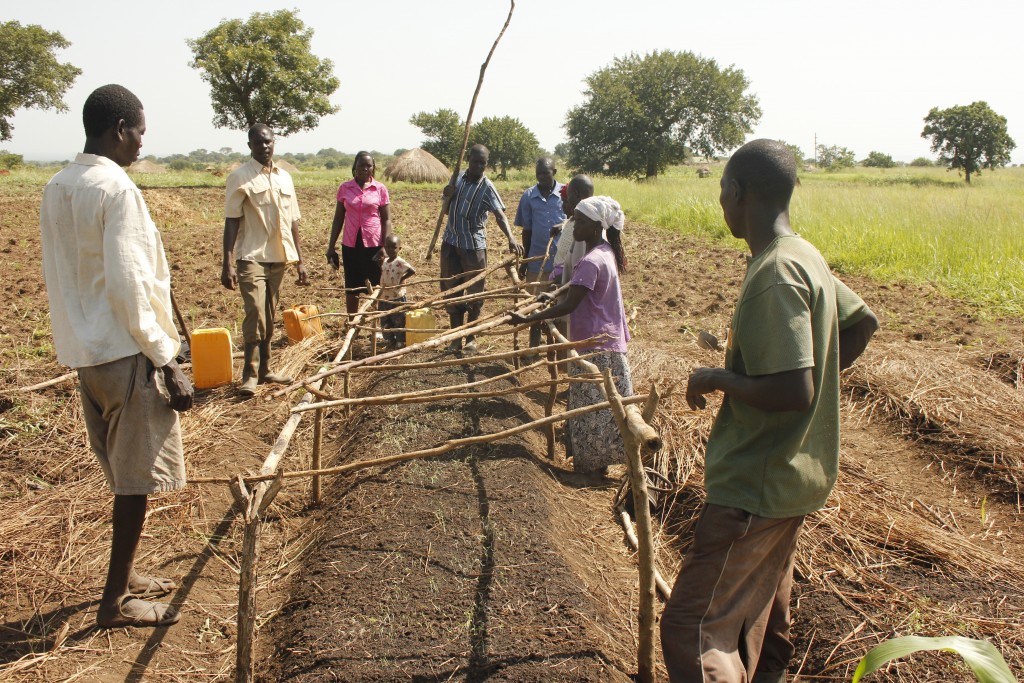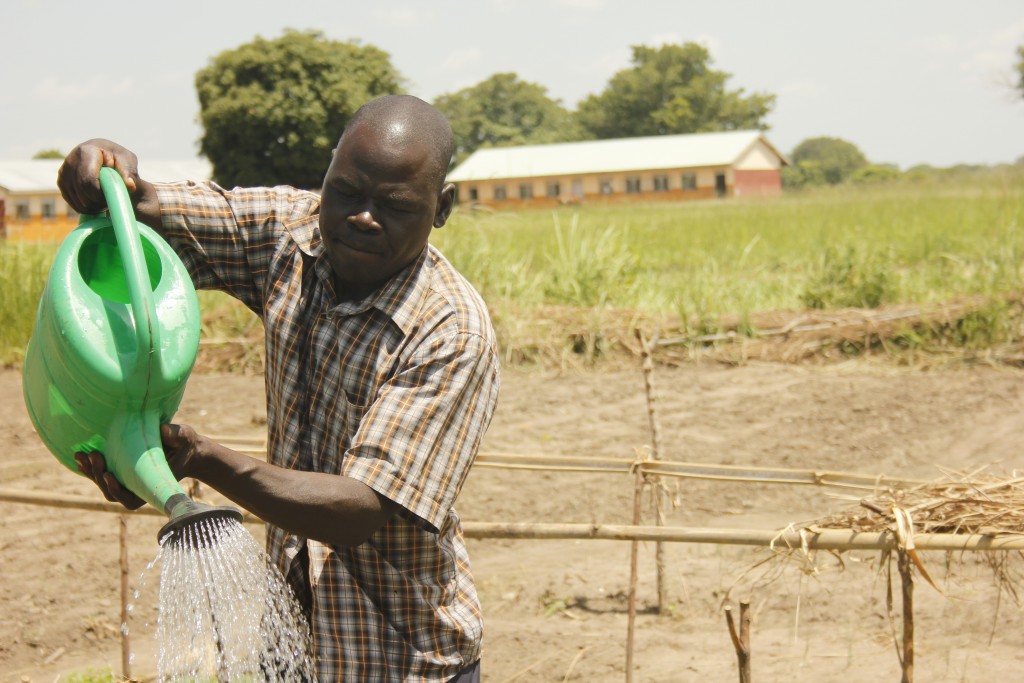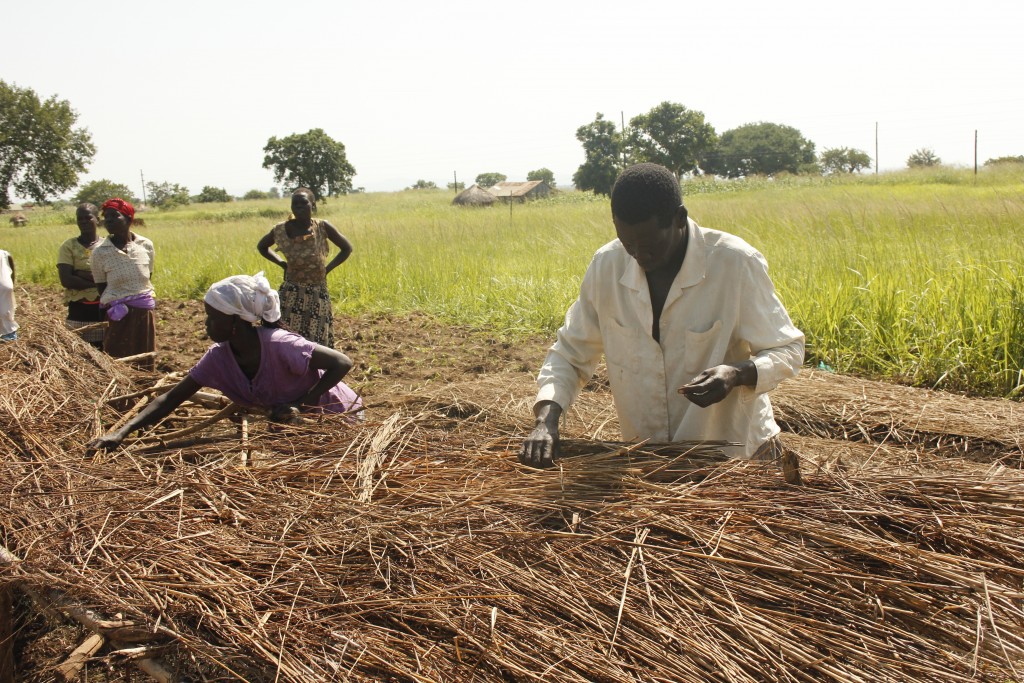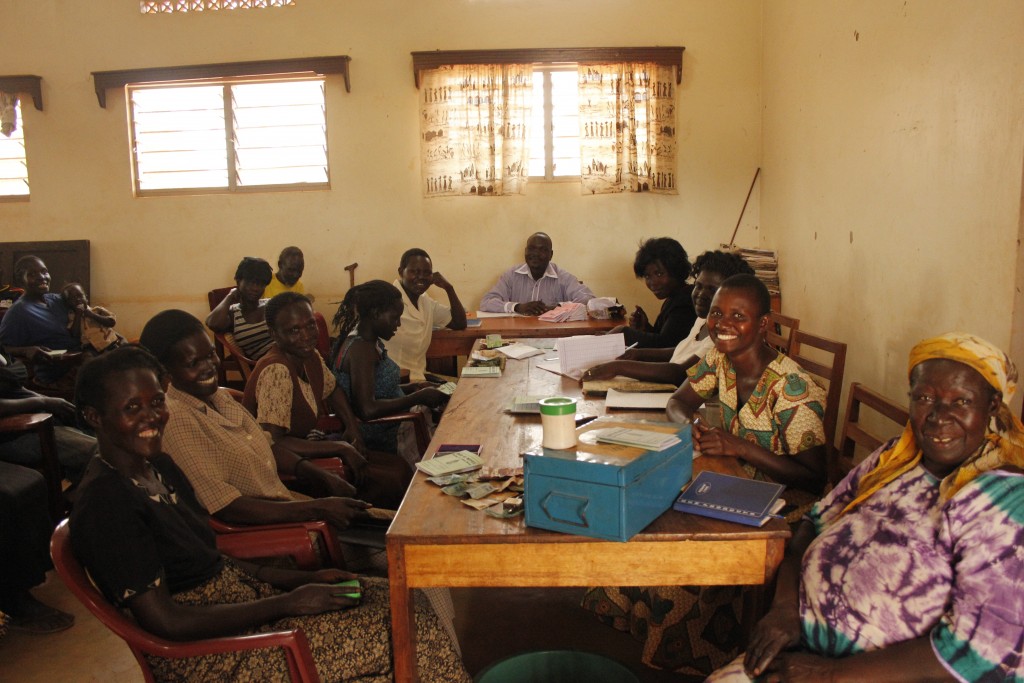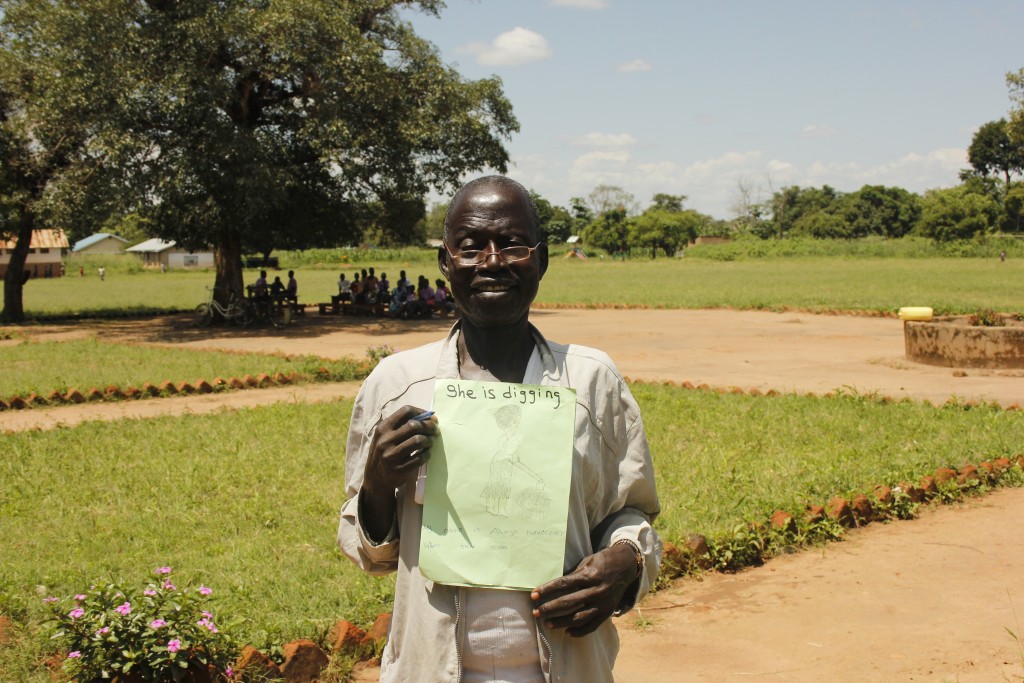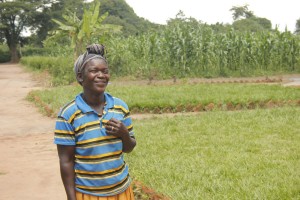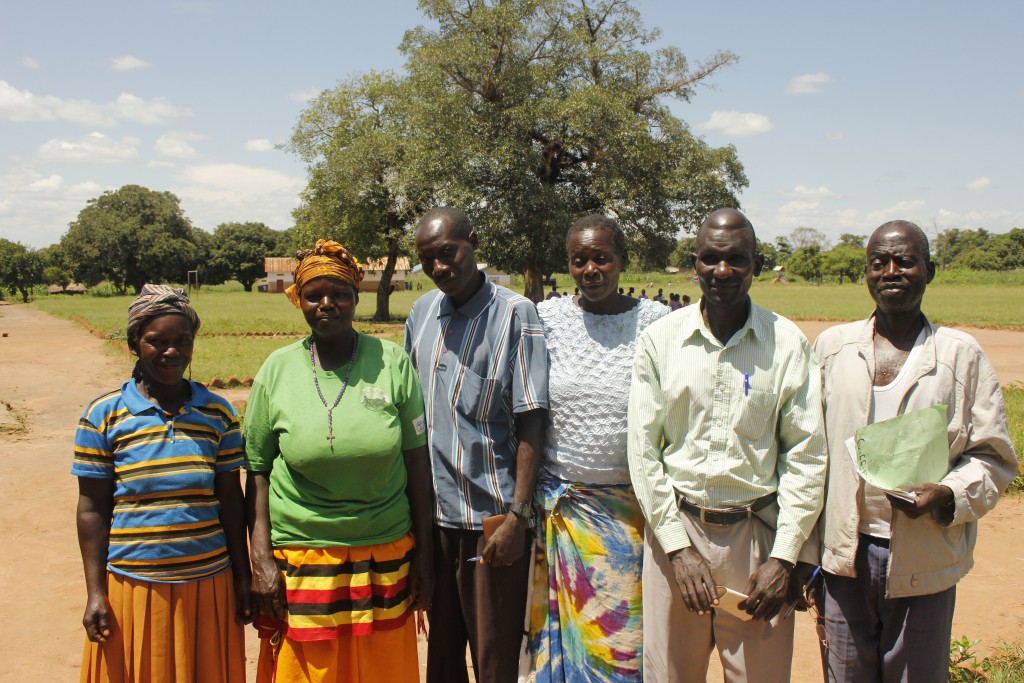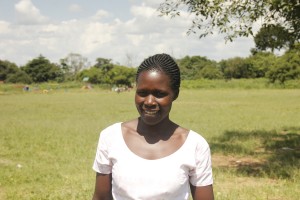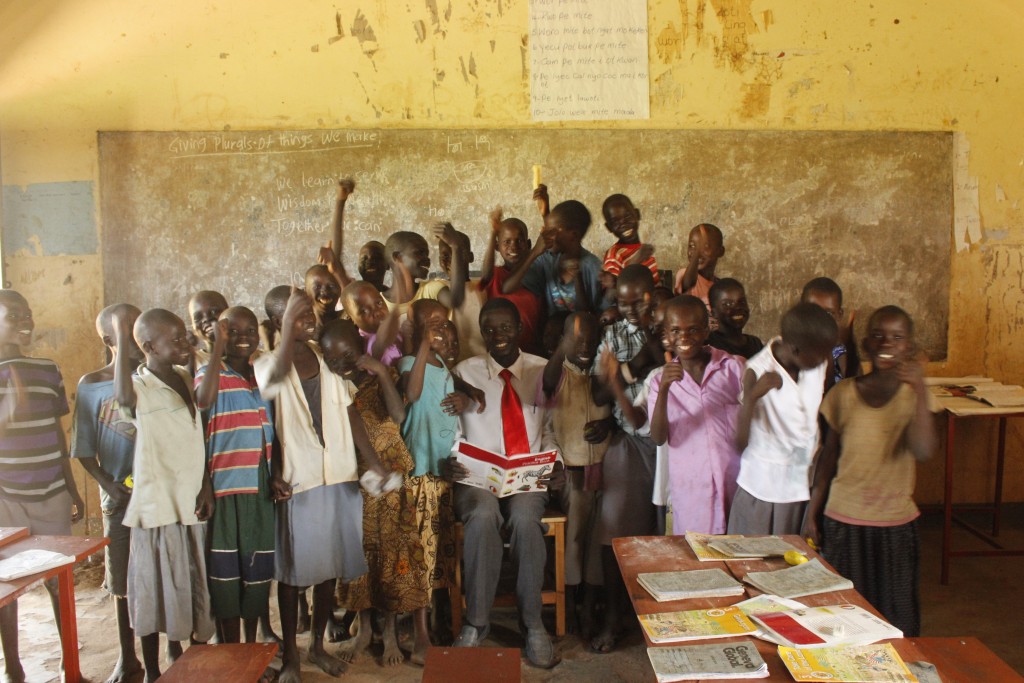New latrines
July 25, 2016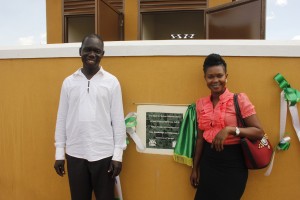 Back in May, we handed over a new latrine block to Teddi Community School in Northern Uganda. As a community school Teddi was set up and run by parents and receives no support from the Government. But last year, pupils at Teddi performed better than those from the local Government school!
Back in May, we handed over a new latrine block to Teddi Community School in Northern Uganda. As a community school Teddi was set up and run by parents and receives no support from the Government. But last year, pupils at Teddi performed better than those from the local Government school!
Posted in News | Leave a comment
Children speed through P1
July 25, 2016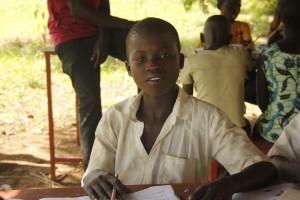 Our 30 Speed School classes in Northern Uganda are taking over 700 children through the first three years of primary school in just one year! So far this year, 733 children have sped through the curriculum for the first year of primary school. And in June, they started the curriculum for Primary 2. By the start of the next academic year in 2017, they will be able to join Year 4 of mainstream primary school.
Our 30 Speed School classes in Northern Uganda are taking over 700 children through the first three years of primary school in just one year! So far this year, 733 children have sped through the curriculum for the first year of primary school. And in June, they started the curriculum for Primary 2. By the start of the next academic year in 2017, they will be able to join Year 4 of mainstream primary school.
Learning to read
July 25, 2016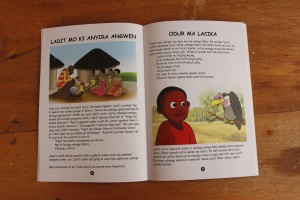 There is a strong story telling culture in Northern Uganda and to encourage reading in our nursery education work, we have developed a colourful book of traditional Acholi folk stories for teachers to read with their pupils. We also created 7 reading books for children, each covering a different topic like what we wear, transport, and places in our community. Each book is printed in English and in Acholi so children learn to read in both languages. We have printed 250 reading books and 60 traditional folk storybooks, which we will distribute to our 10 partner nursery schools. But more are available to order for other schools and organisations to use!
There is a strong story telling culture in Northern Uganda and to encourage reading in our nursery education work, we have developed a colourful book of traditional Acholi folk stories for teachers to read with their pupils. We also created 7 reading books for children, each covering a different topic like what we wear, transport, and places in our community. Each book is printed in English and in Acholi so children learn to read in both languages. We have printed 250 reading books and 60 traditional folk storybooks, which we will distribute to our 10 partner nursery schools. But more are available to order for other schools and organisations to use!
Farming for Education
June 17, 2016More than 80% of Ugandans rely on agriculture to earn a living. Most are subsistence farmers, especially in Northern Uganda. As part of our School Demonstration Gardens, African Revival trains subsistence farmers in new farming techniques on a plot of land near school. This helps farmers improve their productivity at home. But it also brings parents closer to their children’s school. While working on the school garden, parents can also save their money in a Village Savings and Loans Association – which helps them pay school fees on time.
When we asked parents the benefit of the School Demonstration Garden, many spoke about bringing parents closer to the school and creating good relationships between parents, teachers and school management.
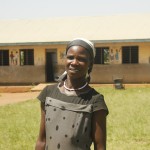 “We used to have a kind of fear between teachers and parents – parents would fear teachers and teachers would fear parents. But now there is good contact between teachers and parents, where teachers even tell us the weaknesses of our children”
“We used to have a kind of fear between teachers and parents – parents would fear teachers and teachers would fear parents. But now there is good contact between teachers and parents, where teachers even tell us the weaknesses of our children”
said Christine, a parent at Pawel Langetta Primary School
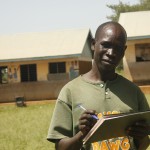 “Our coming to school has made us known to the teachers. Now teachers know which child belongs to which parent. Where the child goes wrong, the teacher can contact the parent directly. If your child is not performing, the teacher will come to you directly as the parent” said Bosco, a parent at Pawel Langetta and Chairperson of the School Demonstration Garden.
“Our coming to school has made us known to the teachers. Now teachers know which child belongs to which parent. Where the child goes wrong, the teacher can contact the parent directly. If your child is not performing, the teacher will come to you directly as the parent” said Bosco, a parent at Pawel Langetta and Chairperson of the School Demonstration Garden.
Parents also talk about being able to monitor their children at school while they are working in the School Demonstration Garden.
 “Some children would leave school early. But now we are working in the garden at school, there’s no way for children to escape school because they know their parents are there. So they stay in school all day long and attend all school activities” said Edward, a parent at Pawel Langetta Primary School.
“Some children would leave school early. But now we are working in the garden at school, there’s no way for children to escape school because they know their parents are there. So they stay in school all day long and attend all school activities” said Edward, a parent at Pawel Langetta Primary School.
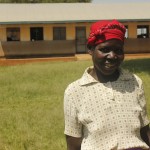 “Some pupils hid out behind buildings when they came to school and skipped class. But now the parents come to school, pupils worry their parents will see them loitering so they go to class”
“Some pupils hid out behind buildings when they came to school and skipped class. But now the parents come to school, pupils worry their parents will see them loitering so they go to class”
said Jessica, also a parent at Pawel Langetta
And finally, with a better relationship between the parents and the school, parents understand how they can best support their children in school.
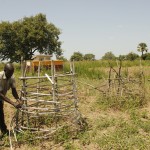 “As a group, we decided to pay the exam fees for all of our children out of the money we saved in the VSLA” said Anthony, a parent at Labala Primary School and Chairperson of the Labala School Demonstration Garden
“As a group, we decided to pay the exam fees for all of our children out of the money we saved in the VSLA” said Anthony, a parent at Labala Primary School and Chairperson of the Labala School Demonstration Garden
“My child’s punctuality has improved because I come to school early to work in the School Demonstration Garden and I never leave my child behind. And when my child gets out of class, I always buy something for her lunch so she’s not hungry when she goes back” said Jessica
Our School Demonstration Garden aims to bring together livelihoods and education – by training parents to improve their agricultural productivity and income at home, and also encouraging support for their children’s education. You can find out more about the School Demonstration Garden project here: https://africanrevival.org/what-we-do/uganda/livelihoods
Posted in News | Leave a comment
How is Speed School addressing the root cause of school dropouts?
May 30, 2016One of the main reasons children drop out of school in Northern Uganda is that their parents cannot afford school fees. Although the Government of Uganda introduced free universal primary education, this money does not cover textbooks, pencils, uniform or school dinners. In addition, Government money often reaches schools months after it is due. The result of this is that Government schools usually ask parents to contribute. For subsistence farmers in rural, Northern Uganda, finding this contribution can be difficult.
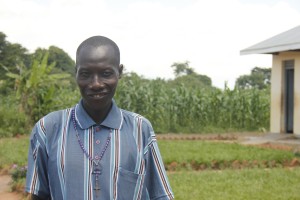 Bonnie is a parent in Northern Uganda and a local church leader.
Bonnie is a parent in Northern Uganda and a local church leader.
“I’m taking care of many children. I have some in primary and others in secondary and that takes a lot of money. So I had one staying at home until I could raise the money for his school fees.”
Bonnie’s situation is typical. Many parents take care of six or more children. And some children lost one or both parents during the insurgency by the Lord’s Resistance Army, which ended in 2006, and are now cared for by single parents or extended family.
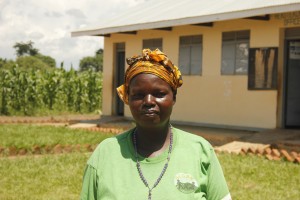 “Grandmothers take care of the children to their daughters and sons. Sometimes the sons have left, or sometimes the sons have divorced their wives. So Grandmothers are taking care of their children. But they cannot pay the school fees for all of their grandchildren so many are not enrolled in school”
“Grandmothers take care of the children to their daughters and sons. Sometimes the sons have left, or sometimes the sons have divorced their wives. So Grandmothers are taking care of their children. But they cannot pay the school fees for all of their grandchildren so many are not enrolled in school”
– Esther, a Grandmother and a member of the Speed School management committee.
To address families’ lack of money for school fees, African Revival helped Speed School parents set up self-help groups. In the self-help group, parents save their money in a Village Savings and Loans Association – a community saving club. Parents deposit a small amount of money each week and can also borrow money from the communal pot and repay it later with interest. Each group meets once a week during the time their children are in Speed School. By encouraging a culture of saving – and providing access to borrowing – Village Savings and Loans Associations help parents pay their children’s school fees on time. This helps break the cycle of absenteeism, where children miss a portion of term and fall too far behind to continue.
“When the VSLA is established, it will help these parents to sustain their children in school. Parents will be paying their children’s school fees through VSLA,” said Esther.
Because parents manage self-help groups, each group can decide if they wish to set up other activities to support the members. Some groups decide to set up income generating activities like farming, or selling crafts. Others use the self-help group as a forum to discuss challenges individual families are facing. From talking with parents in Northern Uganda, you can see they are impressed with Speed School and appreciate the second chance it is giving their children.
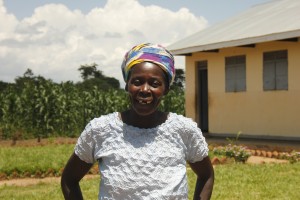 “When these children enrol in primary school [when Speed School has finished], they will have caught up with the rest because Speed School is taking them on a speedy process,” said Joice, a widow and mother of five children.
“When these children enrol in primary school [when Speed School has finished], they will have caught up with the rest because Speed School is taking them on a speedy process,” said Joice, a widow and mother of five children.
“Children are really appreciating the Speed School class and they say it is very interesting to study in Speed School,” said Alfred, a Speed School parent and member of the Speed School management committee.
Many parents have already seen great changes in their children since attending Speed School.
“My child used to wander around in the villages but these days he will come home with a storybook and he will sit at home reading,” said Betty, a mother of six children, one of whom is in Speed School.
“My child has changed a lot. He also used to wander around the villages but now when he comes home he can tell you what he has learnt and how he has been taken care of,” said Esther.
By involving parents in self-help groups, Speed School is helping parents generate income and save it towards school fees. The aim is for parents to be in a better position to support their children through school by the time they come to re-enrol in mainstream primary school.
Posted in News | Leave a comment
Meet Fielda and James: Speed School Facilitators
May 20, 2016Fielda and James are facilitators in African Revival’s new Speed Schools project. James completed a Diploma in Business Administration and was staying at home looking for work when this project started. He told African Revival about his role as a facilitator.
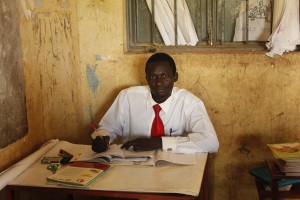 “I come to school every day from 8am to 5pm Monday to Friday and even on weekends if there is any weekend activity. You take 25 children age 9-14 years. If someone is missing school, I follow up and see the cause of them missing school. When I am teaching the children, I treat them as my own because I am responsible for their future.”
“I come to school every day from 8am to 5pm Monday to Friday and even on weekends if there is any weekend activity. You take 25 children age 9-14 years. If someone is missing school, I follow up and see the cause of them missing school. When I am teaching the children, I treat them as my own because I am responsible for their future.”
Fielda was a Grade 1 teacher at Wilacic Primary School. She had never attended teacher training and she knew training as a facilitator would help her professional development.
“When I heard about the role of facilitator I knew I would be trained. With the training I could do a good job as a facilitator and as a teacher at this school when the project finishes.”
Facilitators undertake one week of intensive training before they start teaching. Like James, not all facilitators come from a teaching background. We look for someone from the local school community who can play a holistic role in their children’s education – liaising with parents and acting as a role model in the community as well as teaching a tough, condensed curriculum. Fielda says she learnt so many things from the training.
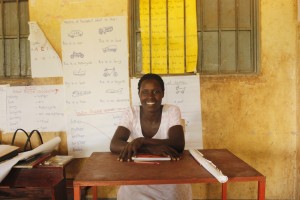 “It was the first time I learnt songs and rhymes that we can use in class. It was the first time I learnt how to make children sit well in the class, how to teach them, how to guide them. I also learnt how to associate with fellow colleagues.”
“It was the first time I learnt songs and rhymes that we can use in class. It was the first time I learnt how to make children sit well in the class, how to teach them, how to guide them. I also learnt how to associate with fellow colleagues.”
James said the training would stay with him his whole life.
“They took us through the process of child development from the womb up to adult. We learnt teaching methods and seating arrangements, and I learnt that a year’s curriculum can be condensed into three months if you are speedy and accurate.”
Although Speed School takes children up to age 14, many have never attended school before.
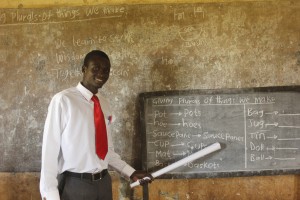 “In my class, sometimes I can be writing something and a child says ‘Sir, let me write that’ and I feel so glad because I know they have learnt. When you teach them, they remember tomorrow. Others already start thinking about a topic before you begin teaching it.”
“In my class, sometimes I can be writing something and a child says ‘Sir, let me write that’ and I feel so glad because I know they have learnt. When you teach them, they remember tomorrow. Others already start thinking about a topic before you begin teaching it.”
Through Speed Schools, facilitators have learnt activity-based learning.
“I always like music, nature and practical learning. This week we are learning about things we make, so we go outside and collect materials and when we come back to the class we make things like pots, and baskets.”
However Speed School is not without challenges. Both Fielda and James agree that teaching a condensed curriculum everyday from 8am to 5pm can be tiring for the children and the facilitators.
James said, “Every day you need to plan, you need to scheme and you need to teach 8 lessons. It’s hard to scheme 8, plan 8 and teach 8 each day. At least we were given a book of lesson plans, so I’m using that a lot.”
Fielda added, “There are also some people who think these children are wild. They look at them and they see no hope in them.”
But the parents are already seeing real changes in their children. And it is clear from talking to Fielda and James that they get a lot of personal satisfaction from seeing the children develop so quickly in knowledge, ability and confidence.
“What I enjoy most is when I come to school and I find the children are already waiting for me” says James
Both James and Fielda agree that those who think negatively about children who dropout will see the results of Speed School at the end of the year, when these children reenrol in mainstream primary school.
Posted in News | Leave a commentCan you help? We need motorbikes!
May 10, 2016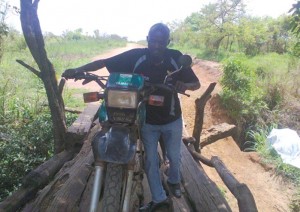 Adequate motorbike access is crucial to our work in Uganda. Motorbikes allow our field staff to travel to rural schools to implement and monitor our programmes and to maintain contact with the communities we work with.
Adequate motorbike access is crucial to our work in Uganda. Motorbikes allow our field staff to travel to rural schools to implement and monitor our programmes and to maintain contact with the communities we work with.
Motorbikes are the only reliable means of transport for our employees to get to these isolated schools, often located in very remote areas which lack basic road infrastructure.
The current lack of motorbikes for our field staff is limiting their ability to work with some schools, especially as we are now entering rainy season in Uganda.
We are seeking £6,187 to buy two motorbikes. With access to these vehicles, we can better reach all of our beneficiaries, as well as expand our support to schools further away.
If you can help, please get in touch on 020 8939 3190 or info@africanrevival.org
Posted in News | Leave a commentA Message from new Interim CEO Jonathan
May 10, 2016Dear Friends,
 It’s great to have the chance to write to everyone connected with African Revival at this time. I’m coming to the end of my first month as Interim CEO and the last four weeks have been interesting, challenging and not a little surprising for many different reasons! I think my biggest surprise was the wonderful AR Golf Day that took place on 21st April at the beautiful Warren Estate in the heart of Essex. We had 60+ guests join us not just for the enjoyment of a day’s golf, but there was also an opportunity to present the work of AR to a group of supporters and potential new supporters. We were very fortunate to have the run of the whole estate as a result of our links with the Utley Foundation, who kindly sponsored our day alongside Ambant, a UK insurance company.
It’s great to have the chance to write to everyone connected with African Revival at this time. I’m coming to the end of my first month as Interim CEO and the last four weeks have been interesting, challenging and not a little surprising for many different reasons! I think my biggest surprise was the wonderful AR Golf Day that took place on 21st April at the beautiful Warren Estate in the heart of Essex. We had 60+ guests join us not just for the enjoyment of a day’s golf, but there was also an opportunity to present the work of AR to a group of supporters and potential new supporters. We were very fortunate to have the run of the whole estate as a result of our links with the Utley Foundation, who kindly sponsored our day alongside Ambant, a UK insurance company.
The result was a great return for AR and a number of new connections who are interested in the work we are undertaking in Uganda and Zambia. And it is to those two countries that I am travelling very shortly to see our work on the ground for the first time; it will be encouraging to see the impact that we are having on the lives of ordinary people – especially the young – at a community level in Africa. For of course, AR is all about people whether children in a southern Zambian school that need a new classroom or parents of local school children in a remote region of northern Uganda who are involved in one of our innovative school garden projects.
We are enormously grateful for all the support that we receive from individuals and groups in this country and are also privileged to link with marvellous partners in Africa. So we become a channel of support for those in Africa with whom we partner. But this channel doesn’t just flow one way; for all of us in AR there is a continuous stream of lessons that we learn from those on the ground and this mutual process of support and learning enables all of us to achieve something special in our different areas of involvement.
So thank you for your continuing support during this coming year and if you ever want to know more, please don’t hesitate to give us a call in the office.
Warm greetings,
Jonathan Hett
Posted in News | Leave a commentGoodbye Lily!
April 29, 2016 Today we say goodbye to our fabulous volunteer, Lily Kelly-Tarrant. Lily has been volunteering with us in the UK office since November 2015 and in that time, she has supported us on a huge number of different areas from fundraising and communications, to admin and events – not to mention our annual Golf Day! And not that we were counting, but she also managed to write 74 funding applications in her time with us – amazing!
Today we say goodbye to our fabulous volunteer, Lily Kelly-Tarrant. Lily has been volunteering with us in the UK office since November 2015 and in that time, she has supported us on a huge number of different areas from fundraising and communications, to admin and events – not to mention our annual Golf Day! And not that we were counting, but she also managed to write 74 funding applications in her time with us – amazing!
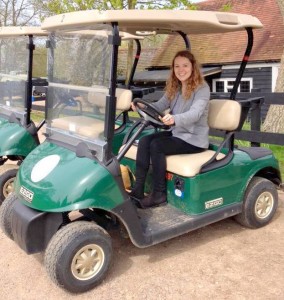 Lily has been an integral part of the AR team for the last few months an absolute pleasure for us all to work with.
Lily has been an integral part of the AR team for the last few months an absolute pleasure for us all to work with.
We wish her all the best as she returns to Sussex University to complete her undergraduate degree in International Development for what is surely just the start of a glittering career in development!
Thank you Lily 🙂
Posted in News | Leave a comment

